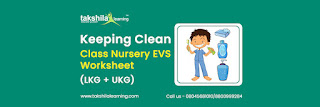What is cleanliness? Grade Lkg and Ukg
What is cleanliness?
In order to achieve and maintain a space that is free of germs, dirt, trash, and waste, one must practise cleanliness.How to be clean?
The actions we should do to keep ourselves clean are as follows:
Brushing our teeth: To take care of our teeth, we should brush them twice a day, once in the morning before eating anything and once at night before we go to bed.
Applying toothpaste to the toothbrush before scrubbing the teeth is how we wash our teeth. We then use water to rinse our mouths.
Bathing - In order to correctly wash ourselves, we should first rinse with water to make our bodies wet and dust-free. Next, we should use soap to our bodies to remove dirt and bacteria, and shampoo to our hair to clean it.
cleaning our hands
Always wash your hands before eating. Our hands pick up a lot of bacteria from the things we contact. When a result, if we eat without washing our hands, the germs will enter our mouths as we eat and cause us to become ill.
As a result, we should always wash our hands before and after eating. To do this, moisten our hands with water first, then use soap to remove any dirt or bacteria.
When water is not accessible, we can also use hand sanitizers to keep our hands clean in public.
keeping our space tidy
We feel happier and more energised in a clean environment. It increases our effectiveness and maintains our health.

Comments
Post a Comment
Thank you we will contact ASAP.